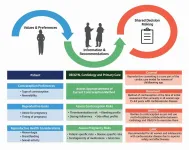(Press-News.org) New Haven, Conn. -- In a new study, Yale Cancer Center researchers have defined the genetic landscape of uterine leiomyosarcomas (uLMS). Furthermore, using fully sequenced patient-derived xenografts, the team has preclinically validated new treatment modalities, which may point to new treatments for uterine cancer. Study results were published online in an early edition of the Proceedings of the National Academy of Science (PNAS).
Uterine cancer is the most common gynecologic malignancy and uterine leiomyosarcomas (uLMS) are highly lethal sarcomas arising from the myometrium, the smooth muscle layer of the uterus. They represent the most common type of uterine sarcomas, which overall account for three to seven percent of all uterine cancers. uLMS have poor prognosis and are characterized by aggressive biological behavior leading to early local and distant metastatic spread.
A collaborative team--which included researchers with expertise in gynecological cancer, genomics, pathology, pharmacology, and computational biology from the United States of America, South Korea, Spain, and Italy-- identified a number of genes that are frequently mutated in uLMS. Using an integrated and comprehensive genetic approach, scientists identified multiple genes with recurrent alterations in uLMS including the homologous-recombination DNA-repair deficiency (HRD), the alternative lengthening of telomere (ALT), C-MYC/BET, and PI3K-AKT-mTOR pathway as potential targets.
"Using two fully sequenced patient-derived-xenografts (PDXs) harboring deranged C-MYC/BET and PTEN/PIK3CA pathways and/or an HRD signature, we found olaparib (PARPi), GS-626510 (BETi), and copanlisib (PIK3CAi) monotherapy to significantly inhibit in vivo uterine leiomyosarcomas growth," said senior author of the study Alessandro Santin, MD, Professor of Obstetrics, Gynecology and Reproductive Sciences at Yale School of Medicine and Disease Aligned Research Team Leader for the Gynecological Cancers Program at Yale Cancer Center and Smilow Cancer Hospital. "Our integrated genetic analysis combined with in vivo preclinical validation experiments suggests that a large subset of uLMS may potentially benefit from existing PARPi/BETi/PIK3CAi targeted drugs."
The team reported results from 83 women diagnosed with uLMS from the U.S. and Italy to determine the molecular basis of the tumor's aggressive behavior. They sequenced the genes from the tumors and identified mutations that are crucial for these tumors to grow. The team also studied the copy number variations--genes that are not mutated but are amplified in the tumors to give them a growth advantage over normal tissues as well as tumor RNA expression levels and gene fusion products.
"The establishment of 2 PDXs with different mutation profiles provided the opportunity for in vivo assessment of whether a mutation profile is predictive of drug response," said corresponding author Joseph Schlessinger, PhD, William H. Prusoff Professor and Chairman of the Department of Pharmacology at Yale School of Medicine and Co-Director of the Yale Cancer Biology Institute. "These preclinical validation studies have suggested new opportunities for personalized therapy."
INFORMATION:
Other authors of the study include Jungmin Choi, Aranzazu Manzano, Weilai Dong and Stefania Bellone, Elena Bonazzoli, Luca Zammataro, Siming Zhao, Gulden Menderes, Gary Altwerger, Burak Zeybek, Natalia Buza, Pei Hui, Antonella Ravaggi, Eliana Bignotti, Chiara Romani, Paola Todeschini, Laura Zanotti, Franco Odicino, Sergio Pecorelli, Laura Ardighieri, Kaya Bilguvar, Ludmil B Alexandrov, Xiaotong Yao, Aditya Deshpande, Samir Zaidi, Adele Guglielmi, Barbara Gnutti, Nupur Nagarkatti, Joan R. Tymon-Rosario, Justin Harold, Dennis Mauricio, Kyungjo Jeong, Charles M. Quick, Vaagn Andikyan, Mitchell Clark, Marcin Imielinski, Dan-Arin Silasi, Gloria S. Huang, Elena Ratner, Masoud Azodi, Peter E. Schwartz, and Richard P. Lifton.
The research was supported as part of a collaborative program with Gilead Sciences, Inc. The study was also funded in part by grants from the National Institutes of Health, the National Cancer Institute, the Deborah Bunn Alley Ovarian Cancer Research Foundation, The Honorable Tina Brozman Foundation, the Discovery to Cure Foundation, the Stand Up to Cancer Foundation, the Guido Berlucchi Foundation, and the Domenic Cicchetti Foundation.
About Yale Cancer Center and Smilow Cancer Hospital
Yale Cancer Center (YCC) is one of only 51 National Cancer Institute-designated comprehensive cancer centers in the nation and the only such center in Connecticut. Cancer treatment for patients is available at Smilow Cancer Hospital through 13 multidisciplinary teams and at 15 Smilow Cancer Hospital Care Centers in Connecticut and Rhode Island. Comprehensive cancer centers play a vital role in the advancement of the NCI's goal of reducing morbidity and mortality from cancer through scientific research, cancer prevention, and innovative cancer treatment.
Overfishing likely did not cause the Atlantic cod, an iconic species, to evolve genetically and mature earlier, according to a study led by Rutgers University and the University of Oslo - the first of its kind - with major implications for ocean conservation.
"Evolution has been used in part as an excuse for why cod and other species have not recovered from overfishing," said first author END ...
BOSTON - Men and women whose mothers experienced stressful events during pregnancy regulate stress differently in the brain 45 years later, results of a long-term study demonstrate.
In a unique sample of 40 men and 40 women followed from the womb into their mid-forties, the brain imaging study showed that exposure during fetal development to inflammation-promoting natural substances called cytokines, produced by mothers under negative stress, results in sex-associated differences in how the adult brain responds to negative stressful situations more than 45 years after ...
High levels of biodiversity in aquatic settings offers a wide range of vitamins, minerals, and fatty acids crucial for human health, a range of nutrients that are lacking in ecosystems where the number of species have been reduced by overfishing, pollution, or climate change, researchers report April 5 in the journal Proceedings of the National Academy of Sciences.
"What we found is that biodiversity is crucial to human health," said Yale's Joey Bernhardt, a G. Evelyn Hutchinson Postdoctoral Fellow in the Department of Ecology and Evolutionary Biology and co-author of the paper.
While humans can achieve their protein requirements even with seafood from less-diverse systems, ...
A growing body of evidence suggests that biodiversity loss increases our exposure to both new and established zoonotic pathogens. Restoring and protecting nature is essential to preventing future pandemics. So reports a new Proceedings of the National Academy of Sciences (PNAS) paper that synthesizes current understanding about how biodiversity affects human health and provides recommendations for future research to guide management.
Lead author Felicia Keesing is a professor at Bard College and a Visiting Scientist at Cary Institute of Ecosystem Studies. She explains, "There's a persistent myth ...
EAST LANSING, Mich. - Nine of the hottest years in human history have occurred in the past decade. Without a major shift in this climate trajectory, the future of life on Earth is in question, which poses a new question: Should humans, whose fossil fueled society is driving climate change, use technology to put the brakes on global warming?
Michigan State University community ecologist Phoebe Zarnetske is co-lead of the Climate Intervention Biology Working Group, a team of internationally recognized experts in climate science and ecology that is bringing science to bear on the question and consequences of geoengineering a cooler Earth.
The group's ...
BOSTON - Addiction is associated with social exclusion, loss of access to resources, and general disengagement from civic life. Now, a study recently published in the journal Psychology of Addictive Behaviors and led by David Eddie, PhD, of the Massachusetts General Hospital's Recovery Research Institute has found that the majority of Americans who have resolved an alcohol or other drug problem report achievements related to self-improvement, family engagement, and civic and economic participation since resolving their addiction. Additionally, it appears these achievements accumulate with time in addiction recovery.
Incorporating data from the Recovery Research Institute's landmark 2017 National Recovery Study, which indicated ...
A new study by Stanford University biologists finds an explanation for the idea that physical characteristics such as skin pigmentation are "only skin deep." Using genetic modeling, the team has found that when two populations with distinct traits combine over generations, traits of individuals within the resulting "admixed" population come to reveal very little about individuals' ancestry. Their findings were published March 27 in a special edition of the American Journal of Physical Anthropology on race and racism.
"When two founding groups first come together, a visible physical trait that differed between those founders initially carries information about the genetic ancestry of admixed individuals," says Jaehee Kim, a postdoctoral research fellow in biology at Stanford and first author ...
In the fight against cancers, activating mutations in the RAS family of genes stand in the way of finding viable treatment options. Now, scientists at the University of Missouri and Yale University have discovered that one of these mutations -- oncogenic RAS or RASV12 -- is also responsible for the regrowth of cancer cells following genotoxic therapy treatment, or drugs that cause damage to a cancer cell's DNA in order to eliminate it from the body.
"Most of our knowledge of how cells respond to DNA damage is mainly derived from studies looking at the single cell level," said Yves Chabu, an assistant professor in the MU College of Arts and Science. "Therefore, we don't know much about how tumor cells respond to DNA damage in the broader ...
URBANA, Ill. ¬- If your day started with a cup of coffee, there's a good chance your morning brew came from Colombia. Home to some of the finest Arabica beans, the country is the world's third largest coffee producer. Climate change poses new challenges to coffee production in Colombia, as it does to agricultural production anywhere in the world, but a new University of Illinois study shows effects vary widely depending on where the coffee beans grow.
"Colombia is a large country with a very distinct geography. The Andes Mountains cross the country from its southwest to northeast corner. Colombian coffee is currently growing in areas with different altitude levels, and climate impacts will likely be very different for low ...
Pregnancy can increase the risk of morbidity and mortality in women with cardiovascular disease; however, many cardiologists are not having pre-pregnancy contraception discussions with their patients of child-bearing age. There is a need to provide evidence-based guidance for contraceptive safety and effectiveness and pregnancy planning options for this high-risk patient group, according to a paper published in the Journal of the American College of Cardiology (JACC). This paper is one of a five-part JACC focus seminar series addressing a wide range of topics in the emerging cardio-obstetrics field.
Prior research has found that 68% of females have had sex at least once by the time they were 17, ...




